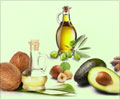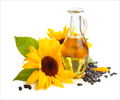Olive Oil Protects against Cancer
Omega-3 fatty acids are essential fatty acids in Olive oil that help reduce inflammation and lower risk of chronic diseases such as cancer and cardiovascular disease.
The bad news is the human body cannot make omega-3 – it has to be derived from the food. Again, when the body uses omega-6 fatty acids, it produces lot of free radicals that contribute to the development of cancer and cardiovascular disease. Unlike sunflower oil and safflower oil that have high omega-6 content as well, Olive oil is a very good source of omega-3. It is one of the ‘healing’ fats since it does not upset the critical omega-3 – omega-6 ratio.
A number of studies have shown that Olive oil protects against cancer. Apart from phenolic compounds and omega-3 fatty acids in Olive oil, especially extra virgin Olive oil, contains substantial amounts of other compounds such as squalene and terpenoids that are deemed to be anti-cancer agents, according to the German Cancer Research Center study published in the European Journal of Cancer Prevention.
Among cancers, extensive research has been done on the effects of Olive oil with respect to colorectal (colon) cancer and breast cancer.
Studies have shown that Olive oil is negatively associated with colorectal cancer (CRC) incidence. A study from Oxford University suggests that Olive oil may influence bile salt secretion patterns which in turn influence polyamine metabolism in the colon in ways that reduce progression towards colon cancer.
Another population based case-control study from Spain found that although total fat intake or specific types of fat are not significantly associated with breast cancer in pre-menopausal or post-menopausal women, higher consumption of Olive oil is significantly related to lower risk of breast cancer.
Studies have also reported the effectiveness of virgin Olive oil in fighting peptic ulcers and gastric cancer. Virgin Olive oil contains a number of phenolic compounds that exert a strong bactericidal activity on Helicobacter pylori that is linked to majority of peptic ulcers and some types of gastric cancer.
One such study published in the Journal of Agricultural and Food Chemistry found that the dialdehydic form of the phenolic compound decarboxymethyl ligstroside aglycon showed the strongest bactericidal effect at a concentration as low as 1.3 microg/mL.






















This is such a great blog post! I am so pleased it came out well! Appreciating the hard work you put into your site and detailed information you present. It’s awesome blog.